Graham Reid | | 9 min read
The Rolling Stones: Back of My Hand (from A Bigger Bang, 2005)
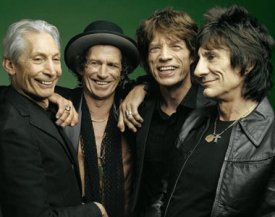
The Rolling Stones stumbled out of the decadent decade of the Seventies into the uncertain Eighties which kicked off with post-disco dance, post-punk, New Wave and other styles which they weren't familiar with.
But what else could these rich boys do but play in a rock'n'roll band?
Not a lot as their career from '81 to the present day proved. Flashes of the old genius, internal fights and then a recovery by playing live to become the most money-making touring machine in the world. That they weren't musically innovative or even relevant hardly seemed to matter. They were The Rolling Stones Incorporated.

Tattoo You (1981): The irony attached to this album, which includes some classic Stones material which sound as good today as they did then -- Start Me Up, Hang Fire and the long, brotherly Waiting On A Friend which closes proceedings -- is that most of the tracks were left-overs from previous album sessions: Waiting on A Friend dated way back to Mick Taylor’s earliest days (that’s him, not Ron Wood, on typically singing guitar); Slave came from Black and Blue sessions; Start Me Up and the rocking Hang Fire were done during Some Girls. Others tracks also fell into the mix from similar origins.
So Tattoo You was essentially a reworked collection of previously unreleased material. That it sounds so consistent, I guess, is testimony to their coherent vision?
There are also some dreary thing (Keith’s Little T&A a prime offender) and the lame Neighbours, but you can understand why they persisted with Black Limousine down the years, it is a direct link back to their 12x5/The Unstoppable Stones period of the early Sixties.
The remastering brings the best out of the sound, especially on the dreamy Heaven (Charlie Watts in exceptional form on brushes), and the version of Slave on the CD is almost two minutes longer than on the original vinyl. That discovery of additional material -- here Sonny Rollins (uncredited) on sax -- is unfortunately rare in any Stones reissue programme.
For an album of knocked together material it is impressive, although the ballads are hardly essential.
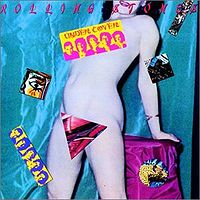
Undercover (1983): And then it all went horribly wrong? By this time most fans had probably stopped listening to Stones albums (this was about their 17th studio album) so it was left to critics to make up their minds for them. But the critics were evenly split, some hailing this as rocking return to form on the basis of tracks like She Was Hot and Too Tough, others couldn’t help note these were weak and unworthy songs beneath the surface.
Jagger and Richards were barely on speaking terms and often out of such situations an anger and energy feeds a band, but you’d be hard pushed to make that case here. It just sounds like a band struggling for direction and even their much vaunted hot-making was found wanting. It was one of the few Stones album which didn’t spring a major and memorable song. Even when they decided to pull out little-known songs from their back-catalogue on their Forty Licks tour few from this one were chosen.
All over the place musically (rock, reggae, post-punk) but not in a good way.
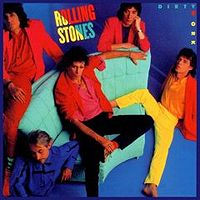 Dirty Work (1985): By this time the Stones were into a familiar holding pattern: a studio album alternating with a live album or a compilation, and in a good five-year plan maybe a tour. This one suffers from poor material, an all but non-existent relationship between Jagger and Richards which was flinty when it wasn’t sullen, and Jagger releasing his first (poor) solo album She’s The Boss to the chagrin of Richards who didn’t hold back in interviews.
Dirty Work (1985): By this time the Stones were into a familiar holding pattern: a studio album alternating with a live album or a compilation, and in a good five-year plan maybe a tour. This one suffers from poor material, an all but non-existent relationship between Jagger and Richards which was flinty when it wasn’t sullen, and Jagger releasing his first (poor) solo album She’s The Boss to the chagrin of Richards who didn’t hold back in interviews.
Oddly enough drummer Watts had fallen to a late-blooming heroin addiction and so was absent for some of the sessions.
Most interest alighted on the video clip for One Hit to the Body in which Jagger and Richards squared off and hammered into each other. Said it all, really.
It did spring the hit Harlem Shuffle (a cover, tellingly) but a listen back suggests there is more going on here than was given credit for at the time. Despite suggestions Jagger was keeping his options open back while he saw how a solo career might go, he attacks material like One Hit, Fight, Hold Back, Winning Ugly and the title track.
It is actually Richards songs (Too Rude, Sleep Tonight), the weak Back to Zero (a limp attempt at resurrecting the Black and Blue period again) and the period-production on songs like the vapid Winning Ugly which pulls this one back.
On a fresh listen however you can take little away from Jagger’s commitment. But still a minor work in an ever-increasing catalogue.

Steel Wheels (1989): As their least artistically successful decade closed, the band seemed re-invigorated and ready to go back to work: Jagger and Richards were reconciled, Jagger’s possible solo career had flat-lined with Primitive Cool in ‘87 (ironically Richards’ solo album of the following year received more critical acclaim, doubtless a knock to Jagger’s ego) and they began writing with almost manic intensity.
It certainly sounds it on this urgent, rock’n’roll, business-as-usual album which was punctuated by some hard hitting riff-driven songs (Mixed Emotions, the busy Hold on to Your Hat, the elemental Rock And A Hard Place) in which Richards and Wood seemed inseparable. Although there were the customary ring-in backing vocalists, brass section and keyboards, Steel Wheels was the sound of a taut rock band. But also one that could haul a crowd onto a clubland dance floor on material like the simple Hearts For Sale.
They leaned just a little to soul-funk/dance floor on Terrifying but you don’t get the sense this was Jagger driving proceedings as Richards and Woods offer chiming support.
Blinded by Love which has hints of Tex-Mex is the track worth discovering, and although Can’t Be Seen isn’t among Richards’ best songs he sounds in much stronger voice than on the previous croaked soak songs on previous albums.
The most musically interesting track is Continental Drift on which they used the Master Musicians of Jajouka from Morocco, the group that Brian Jones had been infatuated by and recorded. Their hypnotic sound -- which many others including Led Zeppelin, has also referred to -- isn’t exactly used to its best effect but it hinted that the Stones were more musically curious than we had been led to believe. It seems a pity they didn’t make more use of it, and that in the decades since they never went back to that source.
Still, they hardly needed to: the album put them on a firm footing and the subsequent tour established them as the most profitable rock’n’roll band in the world. A position they haven’t relinquished yet.
The Stones were now a touring band rather than an album band. They had long since ceased to be musically innovative or relevant, but they were certainly enjoying themselves a lot more. And it spills out on this album.
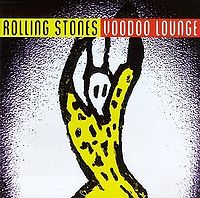
Voodoo Lounge (1994): Now signed to Virgin for that tidy sum, and after some holding-action live and compilation albums, they confirmed their attack: an album and a tour to back it up and kick along sales.
Voodoo Lounge was more memorable as a tour than an album. Their first without bassist Bill Wyman, the album contained the now familiar mix of riff-driven material (Love is Strong, You Got Me Rocking, I Go Wild) and ballads (Jagger‘s New Faces which recalls his songs from around Aftermath in the mid Sixties, Out of Tears and Blinded By Rainbows which deserve a fair hearing), but much of it sounds calculated to conjure up their golden periods and classic singles.
Material like the unmemorable but sui generis Sparks Will Fly sound like they were simply studio-polished from rehearsals.
Richards’ endearingly ragged The Worst became one of his concert staples, but too much of the album -- 15 songs and too long at 62 minutes -- is forgettable. The nod to Springsteen’s Jersey Shore period on Moon Is Up is probably best forgotten.
Sweethearts Together however is real purdy in an alt.country/Caribbean kind of way.
 Bridges to Babylon (1997): Another album and another tie-in tour (with merchandising) -- but at least this one sparked more than Voodoo Lounge, even if no one would come to the Stones expecting originality. Theirs was now brand and the albums were almost incidental.
Bridges to Babylon (1997): Another album and another tie-in tour (with merchandising) -- but at least this one sparked more than Voodoo Lounge, even if no one would come to the Stones expecting originality. Theirs was now brand and the albums were almost incidental.
That said, as always, they could pull out some volatile material (Flip the Switch opens this with an adrenalin rush of white-knuckle intensity), Richards’ (patent pending) riffs drove Low Down and Thief in the Night, and Saint of Me is one of their better tracks which references rock and soul.
Already Over Me is unworthy rubbish, but Gunface showed they could still deliver inner-city menace as they did in the Seventies, largely due to the stuttering guitar work.
But mostly Bridges to Babylon was one for completist fans and although Richards’ and the horns got a fine old reggae sound going on You Don’t Have To Mean It, the song itself wouldn’t be counted among his better moments.
Interestingly Jagger nudged the band towards The Dust Brothers as producers (Richards being a die-hard rock’n’roll bluesman recoiled) but in a couple of places their influence is felt -- to the better actually.
But despite a fairly high count of good material, the album is hardly essential in any Stones collection.
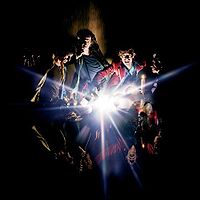
A Bigger Bang (2005): After a long hiatus from the studio during which the customary live, greatest hits and so on filled the gaps while they went out on the Forty Licks tour celebrating four decades of rock’n’roll (scooping US$162 million in just four months) this album was much better than anyone had a right to expect.
In fact this could be their best studio album since Some Girls/Tattoo You.
Overlong at 16 tracks, it still manages to impress for being more direct and cheerfully thrilling on tracks like the opener Rough Justice (which was the Stones aural fingerprint on albums now, a ripping start and a closer by Richards). But the strength of even the lesser material was extremely high by their count and even removing sentiment (most people yearned for that great return to form Stones album) A Bigger Bang re-enforced the notion that they could still pull out riveting songs.
There was also a rare foray into politics (they’d dropped Highwire in ’91, about the Gulf War) when they included Sweet Neo Con about George W Bush: “You call yourself a Christian; I think that you're a hypocrite. You say you are a patriot; I think that you're a crock of shit”.
Nothing the Stones did - not even that sentiment -- would make them relevant in the way they once were but at least you couldn’t, on this album at least, accuse them of jogging on the spot.
Jagger’s ballads -- Streets of Love here where he crosses the Rubicon -- have long been a matter of taste (few are any good for my money) but on the raw blues here (Back of My Hand where he plays slide) he excels. At those times you can hear the boy inside the man who once, long ago, discovered black blues and never forgot.
Perhaps too much at the time was made of this album being the Stones finding themselves again, but the evidence is all here.
There’s something unforced about it and while they might have quite consciously stripped back to rekindle a spirit you’d have to say it worked.
Their only studio album of the new century is a rarity. It was the first album in a couple of decades which made you hope they go back into a room together and do it all again. Can’t say that about too many bands which have been around for a decade, let alone one that has been around for almost five times that long.
Want even more (and earlier) reissued Rolling Stones on CD? Then check out The Rolling Stones; The Sixties: Through the past darkly (again) Or how about The Rolling Stones in the Seventies: The decade of decadence ?


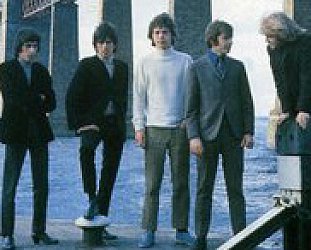



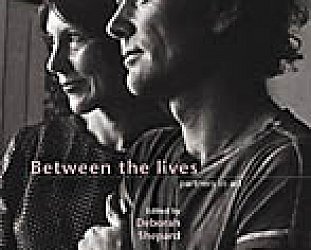
post a comment